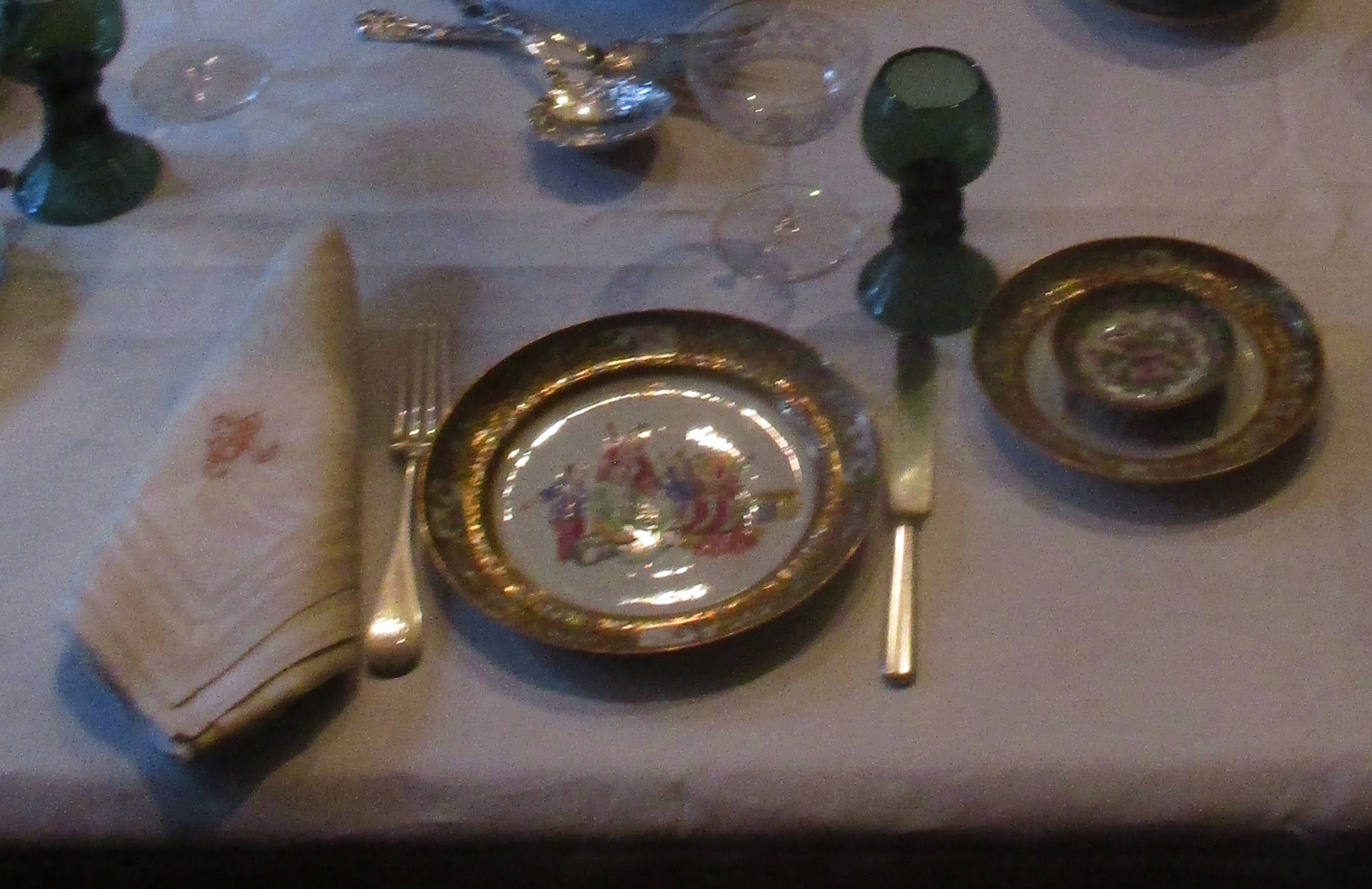This winter Etiquetteer hosted two etiquette dinners for college students, and was surprised by how much anxiety there is about the American vs. European methods of eating. In both one cuts one's food with the knife in the right hand and the fork in the left, but the American method the fork is switched to the right hand to eat, tines up; in the European method one eats with the fork in the left hand, tines down. "What is most correct?!" everyone wanted to know.
The answer, perhaps unsurprisingly, is "When in Rome, do as the Romans do." Americans on the left side of the Atlantic should continue to use the American method. Americans on the right side of the Atlantic should learn the European method and keep their forks in their left hands. Europeans on the left side of the Atlantic can tolerate witnessing the American method at table, but when on their Home Turf . . . well, less so. A better impression is made in Europe by adopting European table manners.
The exceptions to Euro Tines Down are rice and peas. With the fork in the left hand, keep the tines up and push food onto it using the knife or a small bit of bread. For those deeply ingrained in the American method, this takes practice.
Some other questions that came up at these dinners are also work sharing here:
If I've started to eat my roll, and then begin my salad when it's served, when is it OK to go back to eating my roll? Do I have to finish my salad first? Bread does not have to treated as its own course. You may eat as much or as little of it as you wish throughout dinner until the entrée is cleared. (So often they are gobbled down before the salad is served in order to have something to do.) Bread is served not only for itself but also as a utensil, a "pusher" to get food onto the fork. But remember not to use the entire roll to do that. Just break off a piece with your hands.
What if you use the wrong piece of silver? Just keep going. If you run out of silver, quietly ask the waiter to bring you replacements.
What if you see someone doing something really gross, like licking their fingers. Do you say something? Certainly not! Their behavior isn't a reflection on you, unless they are your children under the age of 18. (If between the ages of 13-18, correct with caution in public. The goal is to guide toward perfection, not to spotlight imperfection.)
One exception would be if an employee is exhibiiting bad table manners during a client function, such as licking one's fingers or a knife. In this case bad manners could affect the perception of your business, or you yourself as an employer. It would be rude to call attention to this bad behavior in front of others, but it warrants a Quiet Discussion soon afterward. "[Insert Name of Colleague Here], I don't want to make you uncomfortable, but I noticed at dinner that you were licking your fingers, which isn't really the best table manners outside the home. Please use your napkin next time instead."
How do you get something that doesn’t taste right out of your mouth? Which hand do you use? Does it matter? "Something that doesn't taste right" is different from a bit of bone, shell, or gristle; it implies that something has gone wrong with the cooking*. Without attracting attention, remove the Offending Morsel and either leave to one side of your plate or conceal in your napkin. Since you shake hands with your right hand, using your left hand for this operation is safer. But if you're feeling particularly unsanitary afterwards, excuse yourself to wash your hands in the restroom.
For that bit of bone, shell, or gristle, unobtrusively suck it dry - don't let any meat remain on it - and then quietly get it from your mouth to your hand, and from there to your plate or napkin.
What do you do with your hands when you're not eating? Just leave them in your lap "like a bunch of forgotten violets," as Willa Cather said in her short story "The Old Beauty."
For a business function, how do you choose which restaurant you go to? Assuming that you are the host and picking up the entire check, consider the purpose of the function and the guest list. An after-work team dinner for 14 to launch a new project might be quite different from taking a client to dine to pitch a partnership.
Is it OK if I “slam” [Insert Name of Diet Cola Here] when everyone else is drinking wine? Etiquetteer is often disconcerted to hear violent words like "slam" used to describe something as civilized as table manners. The most violent thing at a dinner table should be nothing more than a pistol-handled knife used properly.
First, never feel obligated to drink anything alcoholic; pressuring someone to drink is not just unprofessional, it's not Perfectly Proper. Next, table manners should not call attention to you, so if "slamming" colas is going to put the spotlight on you, restrain yourself. But just drinking a cola should not single you out if everyone else is drinking wine.
What’s the most pompous thing you’ve seen at a dinner party? Without question it's the long-winded impromptu speech or toast**. Etiquetteer hates to say this, but no one cares about what you have to say. If there needs to be a moment to acknowledge a special occasion or person to the group, keep it short.




















